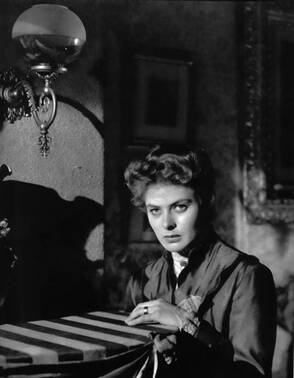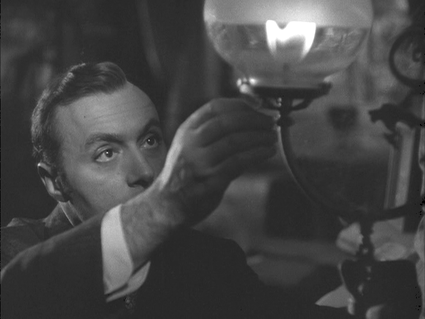 Ingrid Bergman being driven around the twist by misinformation in Gaslight (1944) Ingrid Bergman being driven around the twist by misinformation in Gaslight (1944) LONDON, ONTARIO – No small part of the glory of used bookshops is the utter unpredictability of their stock. While I’m always mooching on the shelves and through the stacks in the hope of finally scoring certain titles or authors, more often than not I come away with some fetching red herring that I didn’t know the first thing about until it swam into my hands unannounced. Sometimes it’s an intriguing title that makes me reach for this book instead of that one. I once heard two publishers seriously argue about which colour covers were most likely to make people pick up their books. But neither title nor colour drew me several years ago while rifling through the Religion section of Attic Books to pull down an 84 year-old volume of 33 pages with no title printed on its solid black spine. Glimpses of England and Germany, 1936, was written by The Very Reverend Kirk B. O’Ferrall, then Dean at the Episcopalian Cathedral of St. Paul’s in Detroit, Michigan. While I wouldn’t exactly call it a favourite book, I treasure it as a singularly instructive one; a sort of object lesson on the need to take care in passing judgement on what you think is going on; a need that strikes me as more germane than ever in this plague-crazed moment in history. Redolent of a lost world of inkpots, blotters and penmanship, Reverend O’Ferrall’s book was meticulously typed up on an old Remington typewriter (probably by his secretary) and then copies were printed on a Gestetner and bound between green cardboard covers with a strip of black tape around the spine. With a flourish of his fountain pen, O’Ferrall signed each title page above a note explaining this was the fourth “annual book” growing out of Sunday afternoon talks about his travels abroad each summer. It sounds like a wonderfully comfy and well-ordered life for our ecclesiastical author. Three years later, O’Ferrall gathered together seven years’ worth of his peripatetic musings into a 148-page bumper collection entitled, Summer Journeyings Among the English Cathedrals. I found copies of this on the ABE booksite for about twelve pounds; one merchant’s description indicating that it was the same sort of backroom production as my 1936 volume: “Text block is detached within boards, apparently a common problem with this book, which is otherwise nice.” St. Paul’s Cathedral still stands at 4800 Woodward Avenue in downtown Detroit, and in times when the Wuhan batflu isn’t raging away, the church has a very ambitious music program but there are no special concerts booked nowadays and its currently scaled down services are also music-free. Perhaps the church’s biggest moment in the national spotlight came in 1947 when Henry Ford’s funeral service was held there, the thousands of mourners outstripping the building’s seating capacity several times over and clogging the surrounding streets. I haven’t been able to determine if O’Ferrall presided at Ford’s funeral or even if he was still the dean of St. Paul’s when, just a couple months later, he impulsively married Mrs. I.W. Morrill, identified as a singer in the St. Paul’s choir. But by the time O’Ferrall’s new wife obtained a Reno divorce a mere thirteen months after tying the knot (among her complaints was that he didn’t like the way she dressed) he was definitely listed as the ‘former dean’ of St. Paul’s. Perhaps it was unseemly imbroglios such as that which explain why I haven’t been able to dig up any complete biographical accounts of Rev. O’Ferrall’s career. Apparently a pretty big deal in his day, he was invited to deliver a homily at the big St. Paul’s in London, England during his 1936 trip and seemed to have no trouble getting introduced to clerical and political bigwigs wherever he went, including the chancellor of Germany, Adolph (as he spells it) Hitler. Much about Hitler troubled him, including the dictator’s violence and loudly trumpeted hatreds and prejudices against all non-Aryans. But even while O’Ferrall sees that unless he is stopped, Hitler will bring on “such a world war as we have never seen on the face of the earth,” he can’t quite help gushing about his brush with greatness as Hitler passes him in a hallway and climbs into a waiting Mercedes; commenting on “Der Fuehrer’s vitality,” “the magnetic glow in his eyes,” and his “gentle smile for all” that “seemed genuine and sincere.” O’Ferrall had a deep love for Germany and had been there many times before. Just four years earlier he had seen first-hand the degradation and destitution of the late Weimar Republic when, saddled with unpayable reparation bills from the First World War and a catastrophically devalued currency, Germans literally had to load up their wheelbarrows with cash to conduct the simplest transactions for scarce staples of existence. Even as he feared where Nazism was leading, he was glad to see Germany getting back on its feet. For the most part, O’Ferrall makes an effort to present a balanced picture, yet slips badly – seeming to lose the human generosity of his faith, the soundness of his judgements, and even the customary grace of his prose – when writing about the Jews. “The Jew was a pariah, an outcast,” he concludes. “He was a wandering Internationalist. Over the face of many lands for centuries, fighting, coming back, he has come in many countries into financial prominence as he has in Germany, arousing a slumbering hatred, that when Hitler came in, broke loose in all its fury. Now dying as a citizenry, treated as pariahs. No physical persecution now! I have that on very good authority, not since the earliest days, but a deep sense of shame and made to feel their inferiority.” What makes me cringe in reading such a passage, and what gives this small book such a dark fascination, are the echoes it sets off of conversations I’m hearing in every quarter today about who can and who can’t be trusted, who gets to speak up and who needs to be censored, who is worthy of our respect and who is deplorable. No one of any honesty – whether they lean left or right – is confident that they are not being played by manipulative forces beyond their control. Who among us isn’t in the dark to some degree as we try to discern the logic or the justice of the movements and initiatives that are gathering force all around us?  Charles Boyer as the manipulative villain in Gaslight Charles Boyer as the manipulative villain in Gaslight Dark agendas are inextricably attached to what, at first appearance, seem to be unquestionably benign movements. Of course black lives matter but why does upholding that seemingly innocuous notion preclude the assertion that all lives matter? Of course we want to do what we can to protect the most vulnerable from a mysterious virus that China (intentionally or accidentally) inflicted on the world but why does that entail further empowering our very biggest retail businesses and killing off the smaller ones? Of course people have the right to peacefully protest but why isn’t that right respected in a uniform way? Why are no charges laid when Indian bands shut down rail service across the country by setting fires and loading debris on the tracks but entire SWAT teams move in on a single pastor protesting the lockdown of his church or a guy who’s struggling to keep his restaurant business solvent? In the wake of a spectacularly shambolic and (one month later) still hotly contested national election, one fears that America is slipping beyond the point of ever recovering trust in its own polity. The hope of achieving any sort of broad-based resolution seems remote but, as ever, at least they’re duking it out. Up here, we’re ever so much more smug and sneaky about it. One week Prime Minister Happy Socks can say, “This pandemic has provided an opportunity for a reset. This is our chance to accelerate our pre-pandemic efforts to reimagine economic systems that actually address global challenges like extreme poverty, inequality and climate change.” And one week later he bald-facedly denies charges from the opposition that he is buying into the poisonous ideology of the ‘reset’ movement as “a conspiracy theory.” And, for the most part, our supine and government-subsidized press lets him get away with it. Eight and a half decades later, it’s pretty easy to sit in judgement of Reverend O’Farrell. The real service a book like his can provide is to challenge us to see half so clearly the unexamined sources of our bigotry and unfairness today. Agreeing with my daughter who contends, “Covid is making everybody crazy,” I would say that knowing when we’ve crossed over such a line is a particularly tricky challenge today. I certainly can’t recall a time to compare with this for brittle and unforgiving cynicism and lashing out at people who offend us politically. I have watched people I know to be capable of discernment and insight go apoplectic about the homophobia (?) and (even richer) the antisemitism of Donald Trump. And they don’t even live in the States. Hell, I’m coming up on the first anniversary next month of my unfriending by one of my oldest pals in the world because I said uncharitable things about Greta Thunberg. We’ve disagreed politically for decades, which was never a problem for me. I mean, I knew he was wrong and I was right (and he knew the exact opposite to be so) but people get to disagree, right? And now, because the times are crazy and everybody’s tetchy, we suddenly have to get a divorce? Speaking of which . . . a sweet couple in our neighbourhood, married for more than forty years, packed it in last year after she flipped out over his purchase of a MAGA hat. One wonders if maybe we’re finding ourselves in this cauldron of mistrust because we’ve done too diligent a job of following the social distancing guidelines that are supposed to help us cope with the pandemic and have estranged us from one another. Huddling a little too exclusively in bubbles with people who think just like we do, rarely having to confront an unmasked face in our public encounters, we seem to have lost our knack for appreciating that it takes all kinds of people to make a world worth inhabiting; that human beings really do jog along most happily when we all aren’t compelled to march in ideological lockstep.
3 Comments
Graeme Hunter
30/11/2020 03:17:23 pm
Thanks Herman for uncovering a still functioning light on moments such as this
Reply
Barry Wells
30/11/2020 05:05:39 pm
Good things happen when you have a pathological liar in the White House.
Reply
Max Lucchesi
1/12/2020 12:15:34 pm
Oh Herman, imagine my disappointment that there was no mention of the magnificent Ingrid in your essay, only you, floundering in a pseudo quagmire of questionable ethics. You cringe at O'Farrall's mild contempory antisemitism but have never mentioned either Waugh or Bellock's virulent version. Possibly they never made you cringe.
Reply
Your comment will be posted after it is approved.
Leave a Reply. |
HERMANEUTICS
If you would like to contribute to the ongoing operations of Hermaneutics, there are now a few options available.
ALL LIFE IS A GIFT :
THE IMPORTANCE OF TRADITION :
Archives
June 2024
Categories
|

 RSS Feed
RSS Feed